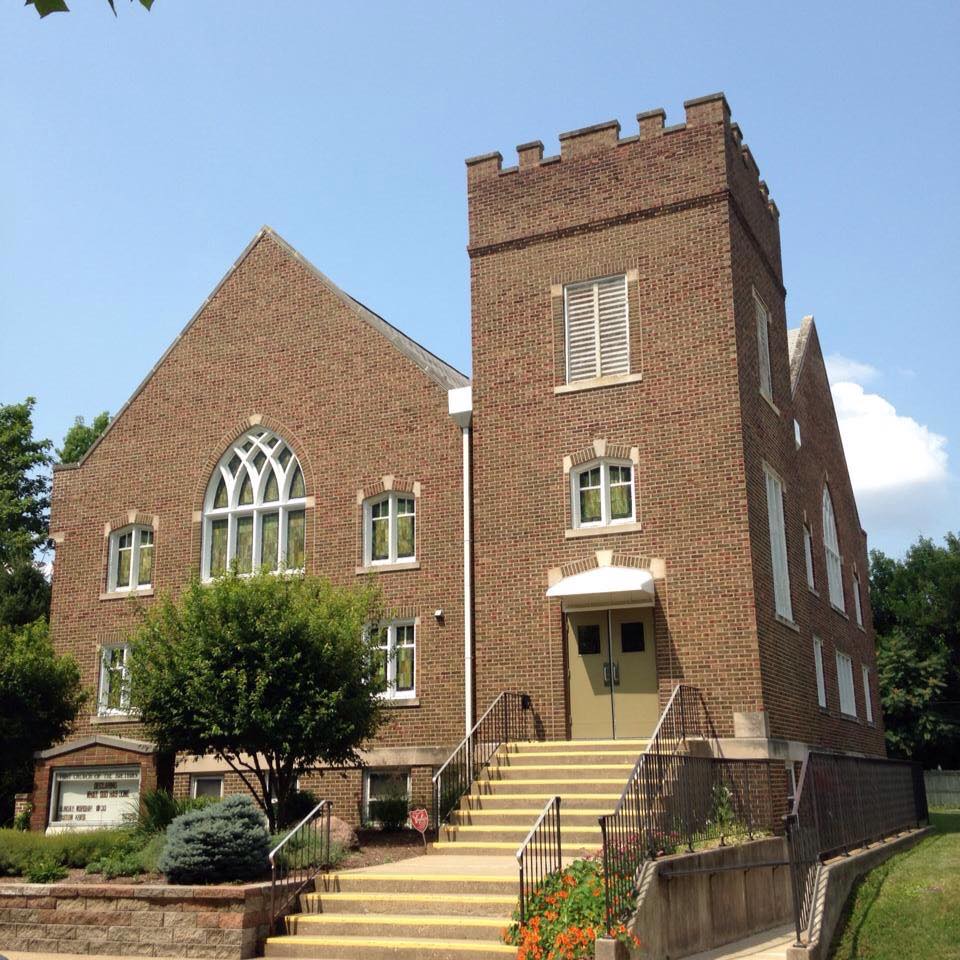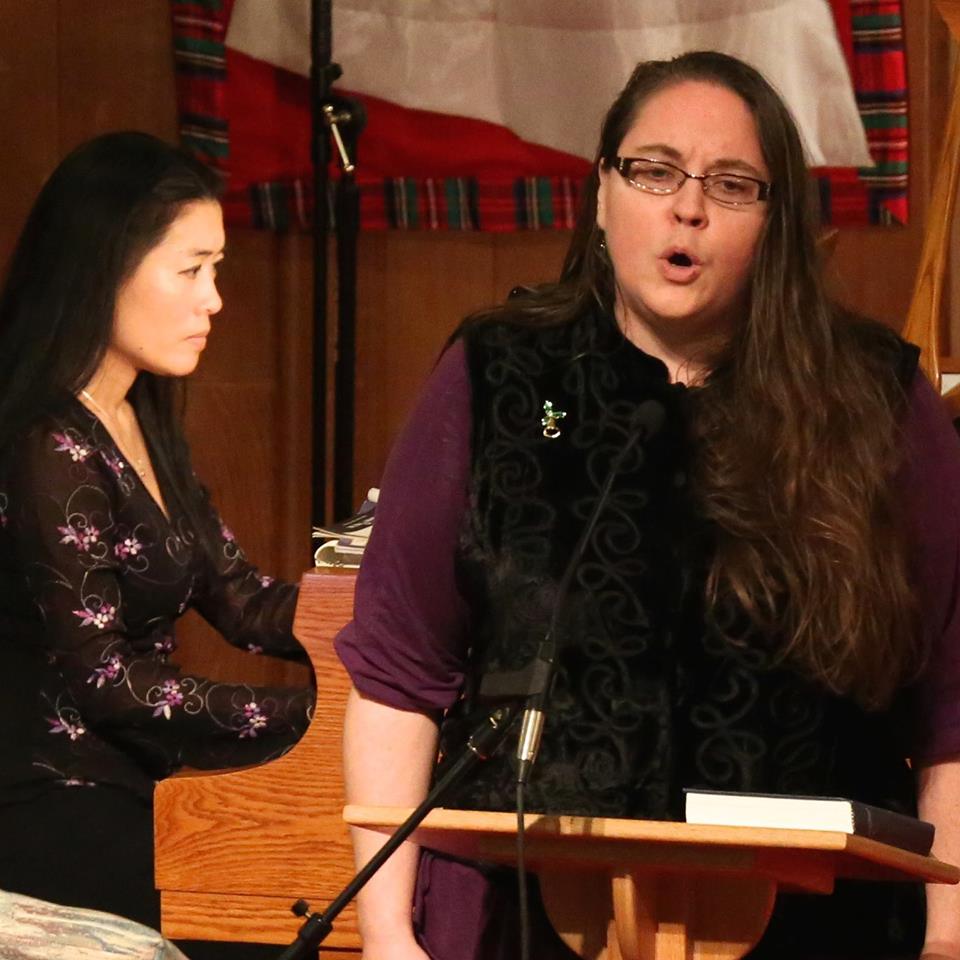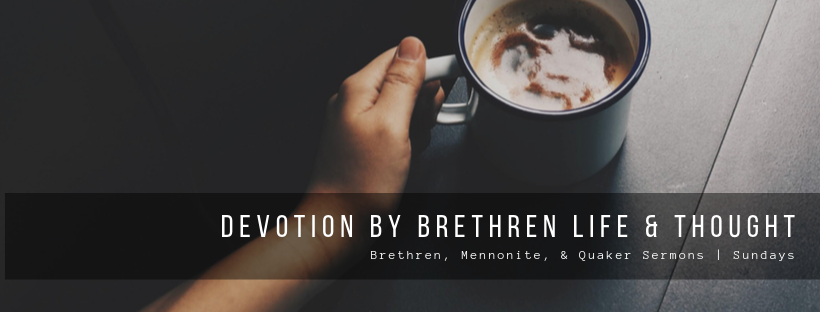
I want you to think back to a time when you felt really, really loved. Maybe a good friend, a brother or sister, a family member, or your spouse, child, or parent, did something unexpected that made you feel truly known, truly loved and cared for. Maybe on your birthday or just some random day when someone decided to do something nice for you.
Tim and I have been feeling really loved and cared for here at First Church since before we even got here, but the best illustration I have from all of our experiences so far is this one: as I was interviewing via Zoom with the board, sitting at my worktable in my living room in the Okanogan valley, with Mt. Whisky clearly visible out the picture window over my shoulder, one of the board members spoke up and said, “We’re noticing there’s a mountain out the window behind you… you do realize that Illinois is flat?” I said I had grown up in North Dakota so I was pretty familiar with prairies! But the being-loved part of the story happened later when I got to my office here at the church. There was a beautiful calendar sitting on my desk, landscape photographs with verses from the Psalms, and a note welcoming me to First Church and to Springfield, that wasn’t signed. Some time later, after the first of the year when I had hung the calendar, Joan noticed that the calendar was hanging and asked if I liked it, which I do. She said, “I chose it because it was all pictures of mountains; I thought it would help you miss Washington less.”
Brothers and sisters, I felt very loved in that moment, by someone who at the time of the kind act had not even met me in person.
One of the distinctives of Brethren practice is the love feast on Holy Thursday before Easter each year, and for many congregations again in the fall. We take very seriously the teaching and example that Jesus gives in the first fifteen verses of John 13, where, taking the place of a household servant or slave, Jesus wraps a towel around his waist and kneels down to wash his disciples’ feet. After having done so, Jesus explains his actions: “Do you know what I have done to you? You call me Teacher and Lord—and you are right, for that is what I am. So if I, your Lord and Teacher, have washed your feet, you also ought to wash one another’s feet. For I have set you an example, that you also should do as I have done to you.”
Our gospel passage for today comes from that same chapter, John 13 – and it is quite a dramatic chapter. Not only does Jesus take the role of a slave and wash his disciples’ feet – an action so shocking that Peter at first refuses to allow it – but it is also in John 13 where Jesus predicts that Judas will betray him, and that Peter will deny him. Sandwiched in between these two predictions is our passage for today, Jesus’s teaching on love.
After Judas departs, Jesus makes a little speech to the disciples who remain, saying, “Now the Son of Man has been glorified, and God has been glorified in him. If God has been glorified in him, God will also glorify him in himself and will glorify him at once. Little children, I am with you only a little longer. You will look for me; and as I said to the Jews so now I say to you, ‘Where I am going, you cannot come.’ I give you a new commandment, that you love one another. Just as I have loved you, you also should love one another. By this everyone will know that you are my disciples, if you have love for one another.”
What does that all mean? Interestingly enough, Peter does raise a question, but his question is about the statement about midway through Jesus’s speech, “Where I am going, you cannot come.” Peter wants to know, “Lord, where are you going?” And that’s a fair question, but I’m curious as to why the disciples don’t seem to have any questions about the first portion of Jesus’s speech, discussing how God was being glorified in the Son of Man. Certainly in the rest of John’s gospel, the disciples have a hard time understanding these sorts of statements – but since part of Jesus’s answer to Peter’s question is to predict that Peter will deny him three times, and it’s quite possible the disciples are too focused on that shocking assertion to remember any questions that Jesus’s earlier statements might have brought up.
It’s not even clear whether the disciples understood exactly what Jesus meant by “Son of Man,” let alone by saying that God was glorified in the Son of Man. The phrase “Son of Man” – ben-adam in Hebrew – is used just over a hundred times in the Old Testament, mostly in the book of the prophet Ezekiel. In that context, it refers to an eschatological figure whose appearance will signal the end of history and the beginning of God’s judgment.
In the New Testament, “Son of Man” – ho huios tou anthropou in Greek – is mostly used by Jesus to refer to himself, more often than he uses the phrase “Son of God.” I mentioned during my message on Easter Sunday that Jesus’s resurrection really is the beginning of a new era for God and for humankind – as Jesus himself said many times, the kingdom of heaven is among us, within us, and at hand. So when Jesus refers to himself as the “Son of Man” in the gospels, he’s claiming that eschatological identity as the figure whose appearance on earth heralds the coming of the kingdom of God or kingdom of heaven on earth.
But what does it mean for Jesus to say that God is glorified in him, the Son of Man? When we think of someone or something being glorified, we think of it being made very special and holy. My mom used to make a salad/dessert for potlucks called “glorified rice” – it was cooked rice to which was added nondairy whipped topping, maraschino cherries, canned pineapple, and canned mandarin orange slices. A whole lot more special than ordinary rice!
But if we think about Jesus’s mission and ministry on earth, especially up until this point at the Last Supper where Jesus is conversing with the disciples, it’s not all that glamorous or glorious. He’s born in a barn, for heaven’s sake, and then spends about 30 years doing nothing much to gain the attention of the gospel writers. When he does start his earthly ministry, he gathers some blue-collar, working-class guys together – fishermen – and starts walking around the countryside proclaiming a message that most people don’t really understand and the ones who do tend to get wrong. Jesus and his disciples don’t have a fixed address, paying job, or much of anything else to their names.
And Jesus knows, at the time of the Last Supper, but his disciples don’t really seem to, that what’s going to happen next is even less glamorous and glorious. He’s going to be arrested, taken into custody by the Roman guards, in the dead of night, like a dangerous criminal. He’ll be subjected to a show trial, tortured, mocked, and finally executed as an enemy of the state. Because the Romans wanted to make an example to anyone else considering a career as a rabble-rouser, those who were crucified for sedition were generally not permitted to be buried but were left on their crosses as food for the vultures. It was a pretty ugly, ignominious way to die.
And yet – that whole scenario – Jesus’s whole earthly career – is exactly what he was talking about when he used the word “glorified.” Because the word translated “glorified” – edoxasthē in Greek – doesn’t quite mean what it means in English, to be made special or holy. Rather, edoxasthē means to have one’s essence revealed. Take a minute to wrap your mind around that. The true nature of Jesus Christ – Son of God and Son of Man – was most fully revealed exactly in his humble origins, his utterly unglamorous ministry, and his absolutely horrifying death.
Jesus was saying to the disciples if you really want to know who God is, and what God is truly like, reflect back on the months we’ve spent together and what we’ve been doing. And pay extra careful attention to what’s going to happen next.
When Jews pray, they often begin their prayers thusly: Barukh ata Adonai Eloheinu, melekh ha`olam. It means, “Blessed are you, the Lord our God, King of the Universe.” Prayers that begin like this often go on to thank God for creating a particular aspect of the universe. The Lord God, King and Creator of the Universe, sounds like a pretty big shot character, doesn’t it? Someone with a lot of power, majesty, prestige, glory…
But what Jesus is trying to get the disciples to understand is that when they see a broken, bloody human body hanging on the cross tomorrow, that is what they should understand God is like.
Come again?
In Paul’s letter to the Philippians, there’s a poem in the second chapter that goes like this: “Let the same mind be in you that was in Christ Jesus, who, though he was in the form of God, did not regard equality with God as something to be exploited, but emptied himself, taking the form of a slave,
being born in human likeness. And being found in human form, he humbled himself and became obedient to the point of death—even death on a cross.” The word that is translated “emptied himself” – ekénōsen in Greek – becomes, in English-language theology, kenosis – the process of emptying oneself for the sake of the kingdom of God.
Jesus’s farewell discourse to the disciples goes on, in John 14, to describe the “many rooms” in his Father’s house, and in John 15, to assert that “No one has greater love than the one who lays down their life for their friends.” It’s almost like Jesus’s Farewell Discourse, across several chapters, is Jesus’s last-ditch effort to get the disciples to understand who he is and what he is about, before the Romans haul him away to stand before Pontius Pilate.
One of the earliest proclamations of the Christian faith after Jesus’s resurrection was the three-word assertion, “Jesus is Lord!” Those three words had a lot of meaning packed into them (still do). First, that Jesus was not just a loving and gifted human teacher but also the Son of God and Son of Man, the Messiah. Second, that if Jesus is Lord, well, Caesar, or any other human ruler, is not. So the early Christians got that part of who Jesus is and what his life, ministry, death, and resurrection meant.
But I’m not sure that we always get the most important part of that proclamation: what it means for Jesus to be Lord, and how that is completely different from how we think of lordship in any other context. It means emptying himself. Giving himself away. Being willing to be last and least, that others might go ahead.
When I was a kid, my family didn’t have a lot of money, so my mom tried not to make extra food that could become leftovers that would go to waste. And all four of us kids loved french-cut green beans from the can. So if you were the last person at the table to get the bowl of beans, it’s entirely possible that you would be handed a bowl of pale green bean water.
But if you were Jesus, being handed that bowl of bean water would suit you right down to your bones. Because Jesus lived, and died, and rose again, so that every other human being on earth who ever lived or ever would live, and indeed all of God’s creation, could have abundant life. And if that meant always being picked last for the softball team, or getting a bowl of bean water with no beans in it, Jesus was and is happy to do that. Because nothing makes God, and the Son of God, happier, than giving up himself so that others can thrive.
What does that mean for us? Because after Jesus explains that in him, the Son of Man, the figure whose appearance heralds the beginning of the kingdom of heaven, God is glorified – and means that God is most fully revealed when Jesus has given most completely of himself – Jesus turns to the disciples and says, Your turn. Just as I have loved you, you also should love one another.
How do we love one another as Christ has loved us? Because what that really means is to empty ourselves on behalf of others.
Those of you who did not get to hear Dr. Rebecca Dali’s presentation a couple of weeks ago on her ministry to those who have been made refugees from other countries or internally displaced within Nigeria by Boko Haram missed a great example of this kind of love in action. Dr. Rebecca’s foundation, the Center for Caring, Empowerment, and Peace Initiative, provides food, clothing, supplies, housing, and livelihood training to people who have lost everything, including husbands and children, to the violence of Boko Haram. It’s a powerful ministry that has touched thousands of lives, and I hope that you will continue to support it with both funding and prayers.
But what struck me most powerfully about Dr. Rebecca’s story was when she shared that she too had been a victim of rape and kidnapping. And out of that pain and devastation, she chose to create something to help others. Her healing is effected in part by helping others to heal from similar injuries and loss.
My mother liked to tell me a story about a woman in the church she grew up in who had lost a child, a deeply wanted and welcomed infant who passed away shortly after birth. What impressed my mom about this lady was that she continued sewing and embroidering an exquisite white infant baptismal gown which she donated to the church. Out of this mother’s grief, her pain and loss, was created something beautiful that every baby baptized in the church could use.
Brothers and sisters, each one of us has suffered pain and loss in our lives. We have had to come to terms with sorrow, heartbreak, illness, rejection, and death, with the loss of dreams of who we or those we love might become. I look at Jesus, his willingness to suffer and die, to give utterly of himself and empty himself on behalf of all humanity, all creation, whom he so dearly loved, I hear him calling us to do the same – to go to those very places of hurt and loss and heartbreak and offer out of them a way for others to be healed and made whole. And in the process, we are promised, we will be healed and made whole ourselves.
When Jesus calls us to love one another as he has loved us, I think this is what he is asking. Will you have the courage to say yes to his call? To let those tender places in our hearts and lives be made whole by finding a way to use them to heal others? Dutch theologian Henri Nouwen calls this way of following Jesus being a wounded healer. You may not think of yourself as a healer, but if there is something in you that has been hurt or broken, in that very place is a way for you to be a healer, if you will let God bless another person through you. Jesus says that this is how the rest of the world will know we are his disciples – if we are willing to let God’s healing flow not just to us, but through us. To let God be glorified – revealed in God’s fullness – through us, through our very brokenness. To let ourselves learn to love and be loved. Amen.
 Bobbi Dykema is currently serving as interim pastor at First Church of the Brethren in Springfield, Illinois. She is also on the pastoral team of the Living Stream online Church of the Brethren and serves on the steering committee of the Womaen’s Caucus. Bobbi is passionate about racial and gender justice, beauty and the arts, and reading scripture as a living document.
Bobbi Dykema is currently serving as interim pastor at First Church of the Brethren in Springfield, Illinois. She is also on the pastoral team of the Living Stream online Church of the Brethren and serves on the steering committee of the Womaen’s Caucus. Bobbi is passionate about racial and gender justice, beauty and the arts, and reading scripture as a living document.


